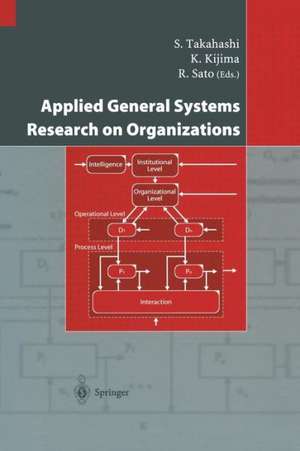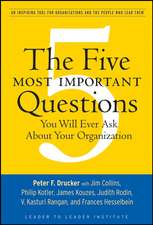Applied General Systems Research on Organizations
Editat de S. Takahashi, K. Kijima, R. Satoen Limba Engleză Paperback – 22 noi 2012
| Toate formatele și edițiile | Preț | Express |
|---|---|---|
| Paperback (1) | 382.18 lei 6-8 săpt. | |
| Springer – 22 noi 2012 | 382.18 lei 6-8 săpt. | |
| Hardback (1) | 389.49 lei 6-8 săpt. | |
| Springer – 19 ian 2004 | 389.49 lei 6-8 săpt. |
Preț: 382.18 lei
Nou
Puncte Express: 573
Preț estimativ în valută:
73.14€ • 75.56$ • 60.87£
73.14€ • 75.56$ • 60.87£
Carte tipărită la comandă
Livrare economică 26 martie-09 aprilie
Preluare comenzi: 021 569.72.76
Specificații
ISBN-13: 9784431679622
ISBN-10: 4431679626
Pagini: 192
Ilustrații: X, 181 p.
Dimensiuni: 155 x 235 x 10 mm
Greutate: 0.28 kg
Ediția:Softcover reprint of the original 1st ed. 2004
Editura: Springer
Colecția Springer
Locul publicării:Tokyo, Japan
ISBN-10: 4431679626
Pagini: 192
Ilustrații: X, 181 p.
Dimensiuni: 155 x 235 x 10 mm
Greutate: 0.28 kg
Ediția:Softcover reprint of the original 1st ed. 2004
Editura: Springer
Colecția Springer
Locul publicării:Tokyo, Japan
Public țintă
ResearchCuprins
Preface.- Authors.- I: Framework 1.- 1 A Formal Model of Organization.- 2 Coordination Principles of Satisficing Decisions.- II: Applications: Intra-organization 61.- 3 Organizational Effectiveness of Information Systems.- 4 Evolutionary Agent-Based Model for Double-Loop Learning.- 5 Asset Allocation Problem Solving.- III: Applications: Inter-organization 113.- 6 Coalition Formation by Organizations.- 7 A Simulation of Industrial Structural Evolution.- 8 Why Stratification of Networks Emerges in Innovative Society.- 9 Learning Dynamics in Platform Externality.
Caracteristici
All the chapters of the book throw light on systemic properties relevant to organizations in terms of a common framework. The framework, known as the organizational cybernetic model, is one of the basic models in mathematical systems theory as well as in systems practice. The model explicitly formulates not only hierarchical and decentralized decision making function but also coordination mechanisms within and among organizations Develops a comprehensive model of organizations by enriching the organizational cybernetic model with such approaches as agent-based modeling and evolutionary economics. In this sense, the book provides us with computational models










